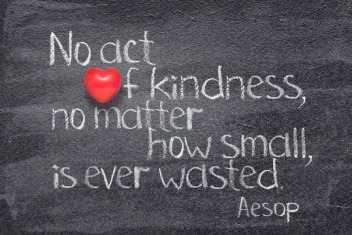Back to ArticlesActs of Kindness: Good for Your Mind and Body

February 9, 2021
Acts of Kindness: Good for Your Mind and Bodyby: Jena Monahan

We all know how powerful
kindness can be, but did you know that it has been scientifically proven
that doing kind acts for others, receiving kind acts, and even witnessing kind
acts provides an abundance of physical and emotional benefits? Just to
name a few, it can lower you levels of stress hormones, decrease feelings of
depression, and increase happiness.
The following charts outlining the beneficial effects
of kindness were made and
provided by the Random Acts
of Kindness Foundation.
Kindness Increases
|
The Love Hormone
Witnessing
acts of kindness produces oxytocin, occasionally referred to as the ‘love
hormone’ which aids in lowering blood pressure and improving our overall
heart-health. Oxytocin also increases our self-esteem and optimism, which is
extra helpful when we are anxious or shy in a social situation. Natalie
Angier, The New York Times
|
Energy
“About
half of participants in one study reported that they feel stronger and more
energetic after helping others; many also reported feeling calmer and less
depressed, with increased feelings of self-worth” Christine
Carter, UC Berkeley, Greater Good Science Center
|
Happiness
A 2010
Harvard Business School survey of happiness in 136 countries found
that people who are altruistic—in this case, people who were generous
financially, such as with charitable donations—were happiest overall.
|
|
Lifespan
“People
who volunteer tend to experience fewer aches and pains. Giving help to others
protects overall health twice as much as aspirin protects against heart
disease. People 55 and older who volunteer for two or more organizations have
an impressive 44% lower likelihood of dying early, and that is after sifting
out every other contributing factor, including physical health, exercise,
gender, habits like smoking, marital status and many more. This is a stronger
effect than exercising four times a week or going to church.” Christine
Carter, Author, “Raising Happiness; In Pursuit of Joyful Kids and Happier
Parents”
|
Pleasure
According
to research from
Emory University, when you are kind to another person, your brain’s
pleasure and reward centers light up, as if you were the recipient of the
good deed—not the giver. This phenomenon is called the “helper’s high.”
|
Serotonin
Like
most medical antidepressants, kindness stimulates the production of
serotonin. This feel-good chemical heals your wounds, calms you down, and
makes you happy! Talya
Steinberg, Psy.D for Psychology Today
|
Kindness
Decreases
|
Pain
Engaging
in acts of kindness produces endorphins—the brain’s natural painkiller! Lizette
Borreli, Medical Daily
|
Stress
Perpetually
kind people have 23% less cortisol (the stress hormone) and age slower than
the average population! Integrative Psychological
and Behavioral Science, 1998
|
Anxiety
A group
of highly anxious individuals performed at least six acts of kindness a week.
After one month, there was a significant increase in positive moods,
relationship satisfaction and a decrease in social avoidance in socially
anxious individuals. University
of British Columbia Study
|
|
Depression
Stephen
Post of Case Western Reserve University School of Medicine found that when we
give of ourselves, everything from life satisfaction to self-realization and
physical health is significantly improved. Mortality is delayed, depression
is reduced, and well-being and good fortune are increased. Dr.
Stephen Post, Ph.D. bioethics professor, Case Western Reserve University
School of Medicine
|
Blood Pressure
Committing
acts of kindness lowers blood pressure. According
to Dr. David R. Hamilton, acts of kindness create emotional warmth, which
releases a hormone known as oxytocin. Oxytocin causes the release of a
chemical called nitric oxide, which dilates the blood vessels. This reduces
blood pressure and, therefore, oxytocin is known as a “cardioprotective”
hormone. It protects the heart by lowering blood pressure.
|
|
Now that we know kindness positively impacts the giver as well as the receiver, we challenge you to engage in one act of kindness every day! Here is a list of simple acts of kindness that can impact your mental and physical health all while making someone's day better.
- Compliment someone, anyone, it could be a perfect stranger or someone you know.
- Pay for the meal, coffee, or toll of the person in line behind you.
- Let someone take your seat.
- Help someone carry their bags.
- Go through each room in your home and donate items you no longer use or do not need.
- Volunteer for a local charity.
- Offer to return someone's grocery cart.
